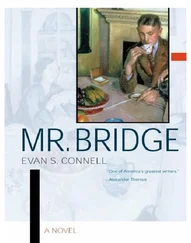She did not enjoy the play, neither did Madge Arlen; they left after the second act. On the way out of the theater Mrs. Bridge remarked, “Frankly, I don’t see why a play like Tobacco Road is necessary/’
“We expected it to be earthy,” Madge Arlen observed with some lenience, “however, I do agree with you. It went much too far.”
It was very hot that summer.
For as long as she could remember, Mrs. Bridge had known that unless she was wearing slacks slacks were worn only for gardening she must wear stockings. In summer this could be uncomfortable, but it was the way things were, it was the way things had always been, and so she complied. No matter where she was going, though it might be no farther than the shopping center at Sixty-third Street, or even if she was not going out of the house all day, she would put on her stockings.
But one morning and an extraordinarily hot day it promised to be, because by ten o’clock the tar in the street was glis-tening she decided not to wear stockings. It was Harriet’s day off, Ruth and Carolyn had gone swimming at Lake Lotawana, and Douglas had gone to a model-airplane meet in Swope Park, so nobody would ever know the difference. Hav-ing selected the lightest dress she could find in her closet, she put on a pair of blue anklets and the clogs she wore at the country-club swimming pool. Thus dressed, she considered herself in the mirror and shook her head at the sight, but went downstairs all the same. The Beckerle sisters, two elderly wid-ows who were seldom seen about the neighborhood, chose that morning to come visiting.
“Oh, goodness,” cried Mrs, Bridge as she greeted them at the door, “I look like something out of Tobacco Road!”
Having been repelled by Tobacco Road to the point where it obsessed her, she employed it as a pigeonhole: whatever she found unreal, bizarre, obnoxious, indecorous, malodorous, or generally unsavory, unexpected, and disagreeable henceforth belonged in Tobacco Road, was from there, or should have been there. So, finding ker son in ragged tennis shoes, she let him know where he was from. He didn’t mind. He had never cared about clothes one way or another, unless lie had become attached to a particular garment, in which case he wore it until she threw it away. Whenever it became necessary to get him some new clothing there would be a quarrel, and after much wrangling the two of them would drive off to one of the young men’s shops where he would be turned over to a clerk experienced in these situations, and finally, after all three of them were exhausted, the purchase was made. The argument in re-gard to the gray suit was typical: ‘Tve already got a suit.”
“But that’s a summer suit/’ she countered.
He looked in his closet and found another outfit. “What’s the matter with this, I’d sure like to know?”
“You’ve outgrown it, and besides, it’s time you got another.”
“I never wore it anyway,” he said triumphantly, his voice changing pitch during the sentence.
“This is absolutely ridiculous. We’re going down to the Plaza right now and get you something to wear, so you might as well get used to the idea.”
“This suit works all right. I don’t want another one.”
“Can you imagine your father going to work In old clothes? Why, he’d be laughed out of court!”
Douglas said he didn’t think it was so funny, and furthermore he couldn’t understand what difference it made; for her part she could not understand why he objected to having new clothes. But, as always, they ended by going to the Plaza, where a very nice gray suit was purchased, although on the way home he said bitterly that he would not ever wear it. He did, of course, as they both knew he would; it was just that he could not admit he liked the suit. In fact he decided it was necessary to claim the suit was giving him a heart attack. Mrs. Bridge was so startled by this announcement that she was temporarily unable to reply.
“Well, it is!” he said, and began to stagger and clutch his chest. “It’s too heavy. I can’t breathe.”
“The only thing wrong with you, my young friend, is your big imagination.”
“Okay, then,” he retorted gloomily. And with his head lowered he walked slowly away, stopping every few steps to feel his heart. At the door he hesitated, and before going out he said truculently, “But I’m just telling you, if I keel over dead, don’t be surprised.”
“Very well,” she replied, “I won’t.”
Mr. and Mrs. Bridge were giving a party, not because they wanted to, but because it was time. Like dinner with the Van Metres, once you accepted an invitation you were obligated to reciprocate, or, as Mr. Bridge had once expressed it, retaliate.
Altogether some eighty people showed up in the course of the evening. They stood around and wandered around, eating, drinking, talking, and smoking. Grace and Virgil Barron were there Grace sunburned, freckled, and petite, and looking rather pensive; the Arlens arrived in a new Chrysler; the Heywood Duncans were there; and Wilhelm and Susan Van Metre, both seeming withered, sober, and at the wrong party; Lois and Stuart Montgomery; Noel Johnson, huge and alone, wearing a paper cap; Mabel Ong trying to begin serious discussions; and, among others, the Beckerle sisters in beaded gowns which must have been twenty years old, both sisters looking as though they had not for an instant forgotten the morning Mrs. Bridge entertained them In anklets. Even Dr. Foster, smiling tolerantly, with a red nose, stopped by for a cigarette and a whisky sour and chided a number of the men about Sunday golf.
There was also an automobile salesman named Beachy Marsh who had arrived very early in a double-breasted pin-stripe business suit, and, being ill at ease, sensing that he did not belong, did everything he could think of to be amusing.
He was not a close friend but It had been necessary to Invite him along with several others,
Mrs. Bridge rustled about her large, elegant, and brilliantly lighted home, checking steadily to see that everything was as it should be. She glanced into the bathrooms every few minutes and found that the guest towels, like pastel handkerchiefs, were still immaculately overlapping one another at evening’s end only two had been disturbed, a fact which would have given Douglas, had he known, a morose satisfaction and she entered the kitchen once to recommend that the extra servant girl, hired to assist Harriet, pin shut the gap in the breast of her starched uniform.
Around and around went Mrs. Bridge, graciously smiling, pausing here and there to chat for a moment, but forever alert, checking the turkey sandwiches, the crackers, the barbecued sausages, quietly opening windows to let out the smoke, discreetly removing wet glasses from mahogany table tops, slip ping away now and then to empty the solid Swedish crystal ashtrays.
And Beachy Marsh got drunk. He slapped people on the shoulder, told jokes, laughed uproariously, and also went around emptying the ashtrays of their cherry-colored stubs, all the while attempting to control the tips of his shirt collar, which had become damp from perspiration and were rolling up into the air like horns.
Following Mrs. Bridge halfway up the carpeted stairs he said hopefully, “There was a young maid from Madras, who had a magnificent ass; not rounded and pink, as you probably think it was gray, had long ears, and ate grass.”
“Oh, my word!” replied Mrs. Bridge, looking over her shoulder with a polite smile but continuing up the stairs, while the auto salesman plucked miserably at his collar.
Читать дальше












